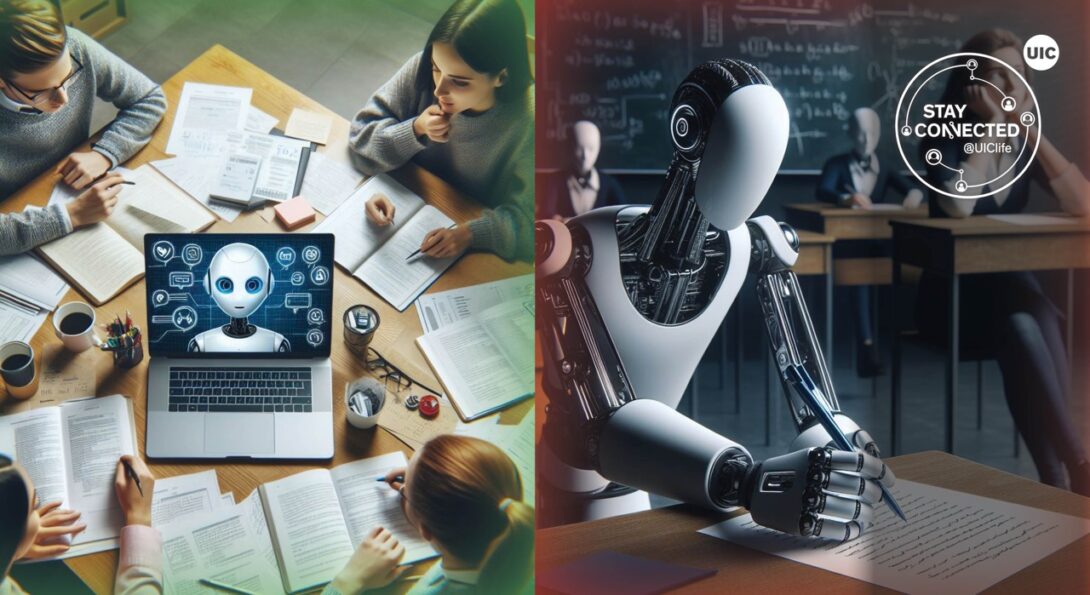Unpacking AI in Academia

Chat GPT’s use of Artificial Intelligence (AI) took the world by storm when it was released to the public beginning in 2022. There has been a lot of controversy whether AI is hurting our cognitive development or enhancing our work, specifically related to students in Academia. UIClife took the opportunity to explore feedback from members of the campus community. Let’s dive deeper into the integration of AI into academia.
Adam Duhachek is a Marketing professor at UIC and a consumer psychologist by training. Duhachek conducts experimental and field experimental research to better understand consumer behavior. He “...immediately embraced Chat GPT in early 2023 with his students asking them to use the tool to assist with the creative process and better develop ideas for brands and companies to improve their marketing.” Some recommendations Duhachek suggests to improve AI are longer conversations, more detail and dialogue, and building emotional responses and politeness. Students can utilize AI to their advantage with tasks, for example, brainstorming, summarizing, and idea generation.
However, confidentiality is a common concern in a world where identity theft makes the headlines regularly. Matthew Miller, is the Director of Student Affairs Technology & ID Center. As someone who works in tech, he suggests never sharing protected data with AI or personally identifiable information like, SSN or financial information, or family heritage information. Once this information is shared, it becomes available for use in any relevant searches. Miller suggests AI is best used for scheduling time and vacation planning. Examples include, Create a 5 day vacation plan from point A to point B. or Generate the most efficient schedule surrounding these hours.
With the right prompts, AI can simplify monotonous and repetitive work. It is worth noting that by reducing the amount of time it takes to complete an exercise, students are removing a vital part of learning, practice. Mitzi Ramos is currently the Associate Director of Graduate Student Professional & Career Development at Latin American Recruitment and Educational Services (LARES) and she has served as the LARES English Academic Skills Specialist for almost two decades. From her personal experience she states, “...the more you write, the more you will improve. If I had relied on AI as an undergrad English and Spanish major, I would NOT have learned how to write because a machine would have been doing the work for me.” Some of the benefit’s Ramos sees in AI is for final reviews of documents, grammar, cover letters and resumes. Overall, she believes that AI will only hinder critical thinking and analytical skills if relied upon.
Taking critical thinking a step further, college students are well-versed in the joy of citing references. Louis Victor Ludkowski, a Lead Full Stack Developer in Student Affairs Technology has dabbled with AI to translate text from Japanese to English. Louis explains, AI such as DeepL and ChatGPT can generate prose (the form of written language that follows the natural flow of speech) and has a good chance of getting the pronouns and topics correct. “In the Japanese language, many parts of a sentence can be dropped and the use of pronouns is very rare. Also, obscure idioms can throw it off.” says Louis. AI can omit certain parts of text it has trouble translating. While AI can do a good job at translating things, critical thinking should lead to questioning the outputs provided. A human proofreader should be on standby to check the AI's work.
Having a human as an external source for validating the output is the best way to go about integrating AI. Utilizing AI for resumes, interview prep and cover letters has become increasingly popular, “It’s important to note that…these tools still suggest that students follow up with career advisors to further develop their skills in these areas.” Mentions Jean Riordan, Executive Director for Career Services. She has been working in student affairs & career services in the Chicago area for almost 30 years. Riordan further suggests that, “...AI tools don’t know you personally, they don’t know your motivation or what drives you to succeed”. By fully relying on AI to help you prepare for interviews you’re restricting yourself from showcasing your identity. AI should be used as a tool for guidance not a replacement for a human being who has aspirations and emotions.
There are many ways to creatively utilize AI in college and students’ everyday life. Let’s unpack the information:
- For better output: conversations must be longer, include more detail and dialogue, and build emotional politeness.
- Good for guidance on: reviewing of documents, grammar, cover letters and resumes.
- Great for: scheduling and planning.
- Avoid: fully relying on AI in order to strengthen critical thinking and analytical skills.
- Never: share protected data and personal information.
- Consider: having an external source for validating the output
If students are on the fence about integrating AI, try utilizing it as a tool for revising cover letters and resumes, improving grammar and tone, or as a final review. UIClife used Microsoft Copilot to generate the image for this blog post! However, avoid generating the entirety of your work, as that hinders your creativity, critical thinking skills, and overall practice. One thing is for sure, AI will continue evolving and students will be empowered to make it part of their college experience.